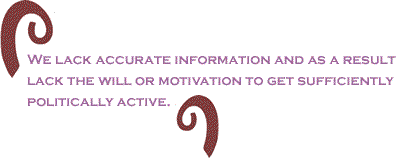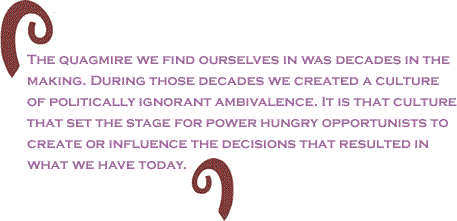|
I
care less about bringing President Barack Obama home than
I care about having a government that exists to work for
the common good – that enacts legislation and carries out
policy that serves the people, not the corporate bottom
line.
To
get that kind of government, we'll need to do way more than
just bring Obama home. We'll need to initiate a culture
change.
When
President Obama came into office, we were in the midst of
two wars, a global economic crisis, were experiencing
record unemployment, runaway debt, skyrocketing foreclosures,
a healthcare crisis, failing public education systems, crumbling
infrastructure, a political system so polarized, crony-ized,
and corrupt that few trust it and, of course, unequivocal evidence that humans are causing runaway global
climate change. What a mess!!
Who
created this mess? And how are we addressing it? 
Mainstream
media and the blogosphere are teeming with articles about
Obama's performance. They say he's too progressive or not
progressive enough, too moderate or not moderate enough,
too harsh on his base or too accommodating, too conciliatory,
cautious, and cerebral - and believe me, there's plenty
his  Administration
has done or failed to do that I find dismaying. Yet, while
it is important to keep tabs on what's going on in Washington,
I don't know if there is much value in debating the president's
performance without also assessing our own. Administration
has done or failed to do that I find dismaying. Yet, while
it is important to keep tabs on what's going on in Washington,
I don't know if there is much value in debating the president's
performance without also assessing our own.
This
mess our country is in was caused by more than just politicians
and none of the problems Obama inherited were of his making.
This is an important point because it goes to the crux of
this piece. The quagmire we find ourselves in was decades
in the making. During those decades we created a culture
of politically ignorant ambivalence. It is that culture
that set the stage for power hungry opportunists to create
or influence the decisions that resulted in what we have
today. Without changing this culture, we're bound
to end up right back here regardless of the decisions made
by this or any other president.
In
2009, at the height of the hoopla over healthcare, Lawrence O'Donnell of MSNBC interviewed a woman who got quite
a bit of media coverage for her emotional confrontation
of then-Senator Arlen
Spector. At one of Spector's town hall meetings, the
woman, Katy Abram, asserted that Spector had awakened a
sleeping giant because of his support of the healthcare
bill and because he wasn't doing enough to restore the country
"back to what our founders created".
Abram
identified herself as a conservative Republican but, for
me, irrespective of her political persuasion, she came to
symbolize a core problem at the root of this nation's woes
– a problem that transcends party affiliation or political
leaning, a problem that Thomas Jefferson predicted could
topple our system. The problem: we lack accurate information
and as a result lack the will or motivation to get sufficiently
politically active.
In
recent times, Americans have typically stayed on the sidelines
as observers until they personally experience the negative
impact of political decisions then maybe they'll show up
at the polls. This "spectator" mentality is even
spreading within the two major political parties where activists
once played key roles but now often see most decisions made
by party insiders and monied interests behind closed doors.

In
response to Katy Abram's confession that she had not taken
an interest in politics until the healthcare town hall debates
of 2009, Lawrence O'Donnell asked why now? "You said
in your statement that you are 35 years old and nothing
has gotten you interested in politics before now,"
O'Donnell asked. "What's interesting to me about that
is that means you, as an adult, lived through 9/11, the
invasion of Afghanistan, the Iraq War, you lived through
all of that and were not awakened into an interest in politics?"
When he asked why those events had no impact on her political
involvement but learning that the Obama administration planned
to provide healthcare to people who would otherwise not
be able to afford it, ignited a fire in her, Abram
responded that, in the past, she'd always had faith in the
government but also went on to say, "Honestly, I didn't
really care".
Perhaps
Abram didn't care about the plethora of ills afflicting
our country because she couldn't see that they would eventually
impact her and her loved ones. Maybe she thought of them
as someone else's problem. Perhaps we can attribute her
lack of civic engagement on pressing issues such as the
encroaching economic crises, global warming, the military-industrial
complex, or the prison-industrial complex, to a lack of
knowledge.

The
interview doesn't give us enough clues to understand Abram's
admitted political inactivity but I think we all know someone
like Katy. Studies, conducted by respected institutions,
suggest that Katy Abram, with respect to her lack of civic
engagement, is a typical American.
In
2005, Georgetown University conducted a study of American civic engagement. According to the study,
when compared to countries in northern and western Europe,
the United States ranked among the lowest in civic engagement.
Of
the 14 countries studied, the U.S. ranked 13th only second
in inactivity to Austria, a country that was incorporated
into the Third Reich and ceased to exist as an independent
state until 1945.
We
fared moderately better in the category of political activity,
ranking in the middle. But in the same study, the United
States ranked #1 in TV watching.
What
the study found was that the population of the United States
has, for the past three decades, become increasingly inactive
in civic organizations while its participation in various
forms of entertainment has increased.
 Civic
organizations that serve to both educate and support the
interests of common people are often so poorly supported
that they are struggling to survive. Organizations such
as labor unions, environmental groups, civil rights organizations,
political parties, human rights groups, consumer rights
organizations, peace or animal rights groups and other interests
can barely sustain themselves today for lack of participation. Civic
organizations that serve to both educate and support the
interests of common people are often so poorly supported
that they are struggling to survive. Organizations such
as labor unions, environmental groups, civil rights organizations,
political parties, human rights groups, consumer rights
organizations, peace or animal rights groups and other interests
can barely sustain themselves today for lack of participation.
In
the early stages of this country's development, it was this
type of civic engagement that served as the cornerstone
of America's successful democratic experiment. Our high
levels of civic engagement are what Tocqueville attributed to our success, but today we've become
a nation of spectators, not activists.
Taken
in isolation, this wouldn't be a recipe for catastrophe
but when you combine the lack of civic engagement with the
lack of civic education in schools and throw in the misinformation
fed to the masses on TV, you get a populace that isn't equipped
with the knowledge necessary to fully participate in democracy
in a meaningful way - a way that ensures their interests
are protected.
All
too often, we just don't know enough about politicians or
issues to vote in a way that is in our best interest. Thomas
Jefferson said, "Whenever the people are well-informed,
they can be trusted with their own government." Can
we be trusted with ours?

Looking
back to the 2008 presidential election, one can't help but
revel in awe at the unprecedented voter turnout. Record
numbers of first-time voters, African-Americans, Latinos,
independents, and young voters put Obama in office. But
that's as far as most of them went. They put him in office
and went back to watching "American Idol." They
walked away at one of the most pivotal times in American
history.
Imagine
the power of an administration that had the same awe-inspiring
numbers that came out to vote for Obama – this time supporting
the progressive agenda with activism, pushing for change
by phone banking for progressive candidates in the 2010
election, or writing to Congress about prison-based gerrymandering,
or marching en masse to protest the Citizens United decision,
or forcing Congress to hold BP accountable for the clean
up in the Gulf of Mexico, or supporting the Administration
on any number of the pressing issues it confronts.
The
monied interests in this country have a clear set of goals
and a roadmap for achieving them. Yes, Wall Street gets
what Wall Street demands. I contend that a mobilized progressive
movement continually pressuring the Obama administration
can also get what it demands. But as long as Katy Abram
and the many varieties of Katy both on the Left and the
Right continue to dominate the political landscape of this
country, we'll continue to have this debate.
As
did his predecessor, Franklin Delano Roosevelt, President
Obama has challenged his supporters to "force"
him to make the tough, progressive decisions they want.
With a precious few exceptions, we have failed to do that.
Until we do, we need to worry more about the home we have
made than about bringing Obama back to it.

Click here to
read any commentary in this BC series.
Click here to
send a comment to all the participants in this BC series.
BlackCommentator.com Columnist Sharon Kyle Sharon Kyle is the Co-Founder and Publisher
of the LA
Progressive an online social justice magazine. With
her husband Dick, she publishes several other print and
online newsletters on political and social justice issues.
In addition to her work with the LA Progressive, Ms. Kyle
holds a Juris Doctorate, is an adjunct professor at Peoples
College of Law in Los Angeles, and sits on the board of
the ACLU Pasadena/Foothills Chapter and the Progressive
Caucus of the California Democratic Party. Click here to contact the LA Progressive and Ms.
Kyle.
|

